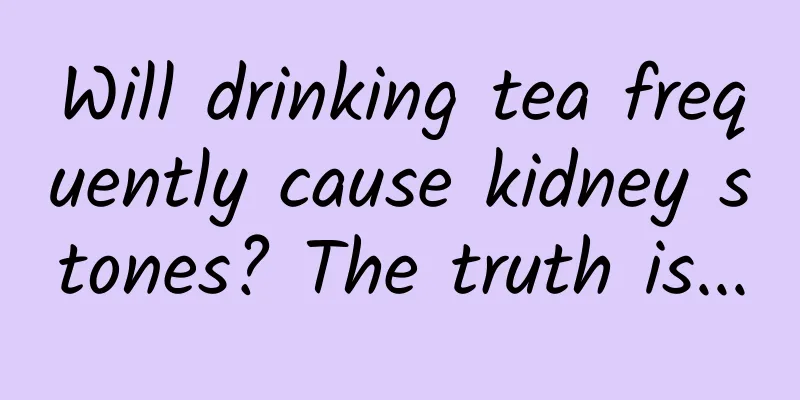Will drinking tea frequently cause kidney stones? The truth is...

|
“Drinking tea frequently can lead to kidney stones.” It is said that tea has a high oxalic acid content and drinking tea frequently can cause kidney stones! Rumor analysis: This is not true. Tea does contain oxalic acid, which is related to the occurrence of kidney stones, but the tea polyphenols, caffeine, tea polysaccharides and tea pigments in tea can effectively prevent the occurrence of stones. From another perspective, drinking tea also consumes a lot of water, which is also helpful in preventing kidney stones. Will drinking tea frequently cause kidney stones? Tea has been consumed in my country for thousands of years and is considered a healthy drink. In the relationship between tea drinking and kidney health, people believe that the oxalic acid contained in tea is a high-risk factor for the formation of calcium oxalate kidney stones. However, some studies have mentioned that tea polyphenols, caffeine, tea polysaccharides and tea pigments in tea can effectively inhibit the formation of kidney stones. The mechanism is related to diuresis, antioxidant effect to reduce cell damage, inhibition of adhesion between crystals and renal tubular epithelial cells, lowering blood uric acid levels, regulating intestinal microorganisms and metabolic syndrome. A large prospective study from Shanghai, China found that men who drank green tea for a long time had a lower risk of kidney stones than men who never drank tea, and there was a trend that the risk of kidney stones decreased with increasing monthly tea drinking. Epidemiological surveys have also found that increasing tea drinking reduces the risk of kidney stones. Copyrighted stock images, reprinting and using may cause copyright disputes In addition, some people worry about the oxalic acid content in strong tea. Among common teas, the average oxalic acid content of black tea and dark tea is higher than that of green tea, and the oxalic acid content of autumn green tea is higher than that of spring green tea. The total amount of catechins from high to low are green tea, yellow tea, oolong tea, white tea, dark tea and black tea. Therefore, it is recommended to choose spring green tea (high grade is not recommended) and brew it for no more than 5 minutes, which can minimize the intake of oxalic acid and obtain more tea polyphenols, which can better inhibit the formation of kidney stones. If you like to drink black tea, you can add some milk to reduce the excretion of urinary oxalic acid. As for the so-called strong tea and weak tea, it is just a relative term and there is no unified definition at present. For example, 5 grams of tea leaves soaked in a small amount of water for a long time is different from 5 grams of tea leaves soaked in more water for the same time. Although the concentrations of the two are different, if you drink all of them, the ingredients you ingest are the same. Therefore, as long as the amount of tea is certain, there is no need to worry about the concentration of the tea. The key is that it does not taste bitter and you can accept it. Based on existing research, we don’t need to worry too much about drinking tea causing kidney stones. Drinking tea in moderation over a long period of time can prevent the formation of kidney stones. A study mentioned that drinking ≥240 ml of tea per day may be associated with a 16% lower risk of kidney stones. There are also literatures that mention that the longer the duration of tea drinking, the better the preventive effect. Tea consumption ≥20 cup-year can reduce the risk of kidney stones by 20%, while <20 cup-year is meaningless. Cup-year is the product of the number of cups of tea consumed per day (120 ml is one cup) and the number of years of tea drinking. For example, drinking 2 cups of tea per day for 10 years can reduce the risk of kidney stones by 20%. In addition, we also drink a lot of water while drinking tea, and drinking enough water is also helpful in preventing kidney stones. What causes kidney stones? The occurrence of kidney stones is closely related to an unreasonable diet, such as a high-protein diet, a high-purine diet, a high-oxalate diet, a high-salt diet, etc. 1. High-protein diet It will lead to an increase in the content of calcium, uric acid and oxalic acid in urine and a decrease in urine pH and citrate content. The increase in the content of calcium, uric acid and oxalic acid in urine can promote stone formation; while citrate is an inhibitor of stone formation, and a decrease in urine pH will also promote the formation of calcium oxalate crystals. Copyrighted stock images, reprinting and using may cause copyright disputes 2. High-purine diet The metabolic end product of purine is uric acid. Excessive intake of a high-purine diet will not only increase the excretion of uric acid in the urine, making it easy to form uric acid stones; it will also increase the formation of endogenous oxalic acid, thereby increasing the risk of calcium oxalate stone formation. 3. High Oxalate Diet Oxalic acid is one of the important factors in the formation of kidney stones. Oxalic acid combines with calcium to form calcium oxalate crystals, increasing the risk of stones. 4. High-salt diet Eating more salt means consuming more sodium. Excessive intake of sodium salt can increase the excretion of calcium and cystine in urine, reduce the excretion of citrate in urine, increase urine pH, and thus increase the risk of stones. In addition, some bad habits, such as not liking to drink water, taking medicine indiscriminately, holding urine for a long time, staying up late, smoking, etc., will also increase the risk of kidney stones. Basic dietary principles for patients with kidney stones 1. Eat less sauces and pickled foods Eat less sauces and pickled foods, as well as processed foods such as instant noodles, konjac, sausage, Chinese sausage, spicy strips, etc. As for cooking salt, it is recommended to control it to no more than 5 grams per day, which is less than 1 beer bottle cap (with rubber pad). 2. Avoid excessive intake of animal protein Although animal protein is high-quality protein, people who already have kidney stones need to control their intake to avoid adding burden to the kidneys. For animal food, white meat such as fish and poultry can be appropriately selected, and red meat such as pork, beef, and lamb should be eaten as little as possible, generally 1 to 2 times a week, and no more than 50 grams each time. 3. Drink enough milk Milk is an important way for us to supplement calcium in our daily life. It is recommended that patients with stones use milk as the main source of dietary calcium, and it is recommended to drink 300 ml of milk every day. In recent years, a large number of studies have shown that a high calcium diet is associated with a reduced risk of stones. The possible mechanism is that high calcium binds oxalic acid in the intestine, reducing the absorption and excretion of oxalic acid in the urine, and reducing the urine oxalate/calcium ratio. In addition, dairy products may contain certain factors that inhibit stone formation. 4. Eat more fresh fruits and vegetables Fresh fruits and vegetables contain nutrients such as dietary fiber, mineral potassium, and antioxidants, which help prevent and reduce kidney stones. 5. Limit foods high in oxalate For foods with high oxalic acid content, they must be blanched before eating to remove most of the oxalic acid, such as spinach, amaranth, water spinach, wild rice stem, winter bamboo shoots, etc. 6. Drink plenty of water Drinking more water is beneficial for patients with kidney stones. It can not only prevent the formation of stones, but also promote the excretion of stones. Drink at least 1500~1700 ml a day, preferably 2000~3000 ml, especially in hot weather or when doing strenuous physical activities, you should pay more attention to hydration. Looking in the mirror of rumors Drinking tea frequently is not the main cause of kidney stones. To prevent kidney stones, you should pay more attention to eating less foods that are not friendly to the kidneys and changing bad eating and living habits. These rumors often assert that a specific behavior or food causes a specific health problem, such as drinking tea causing kidney stones, rather than considering a complex cause-and-effect relationship that includes other possible factors. Review | Ruan Guangfeng, Deputy Director of Kexin Food and Health Information Exchange Center |
<<: Nature sub-journal: Subverting cognition! Do we really need to be "brainwashed"?
>>: Gene-edited insects: Small yet powerful
Recommend
This kind of meat is really not edible! It is very dangerous! (People in the south should pay special attention)
Snakes give people the impression of being cold a...
Ping An Life Insurance Policy Query: How can we make our website pages favored by search engines?
Website pages are not favored by search engines a...
Three Mentality of Chinese People When Buying Mobile Phones
Buying a mobile phone is a complicated process. T...
With the rush to promote new technologies, has the mobile phone industry become "involutionary"?
Competition in the mobile phone industry is becom...
What is the magic of big data from the Internet to the Internet of Vehicles?
The movie that has been popular in the circle of ...
Liu Heng's I Ching: Lectures on Physiognomy
Liu Heng's Physiognomy Lecture Room Resource ...
Xiaohongshu’s methodology for building a brand
A friend asked me: I have several brands operatin...
The essence of optimizing information flow advertising in 4 industries including home furnishing, decoration, and tourism!
Today, the editor continues to bring you the esse...
Information flow advertising: How to reduce customer acquisition costs by 75% in 30 days?
Information flow advertising has developed rapidl...
Short video information flow picture material optimization case
In recent years, disputes in the short video indu...
Is the information flow product-centric or user-centric?
In life, the things we come into contact with the...
Being fined NT$2.3 million for digging up "succulents", just take a look at this kingdom of succulents!!!
When we mention the desert, the first thing that ...
Electric Technology Car News: 7 seats + DCT SAIC's new Baojun 560 can save the declining sales
I believe everyone is familiar with the Baojun 56...
14,000 apps were removed from the shelves at the same time, and Apple once again triggered a delisting storm!
Yesterday (May 6), the trend of apps being remove...









